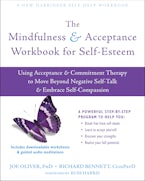By Joe Oliver, PhD & Richard Bennett, ClinPsyD, coauthors of The Mindfulness and Acceptance Workbook for Self-Esteem
The irony of the self-esteem movement, which has focused for decades on improving self-esteem, is that the evidence suggests that efforts to improve self-esteem don’t work. A famous review of over 20,000 self-esteem studies concluded that boosting self-esteem does not cause any demonstrable benefits (Baumeister et al 2003). Yikes! In fact, some really unhelpful outcomes were also found. Inflated self-esteem has been linked with unhelpful individualism, narcissism, and reduced cooperation with others.
It turns out that the way forward might be in the last place you would expect it to be—working on accepting who you are, rather than striving to be different. This is often referred to as self-acceptance. Accepting ourselves can feel counterintuitive in Western culture, which frequently equates ‘better’ with ‘more’ and can lead to a never-ending quest for improvements. Often, relentless betterment is based on underlying self-stories such as “I am not enough” (and all of the variants, such as “failure,” “fraud,” “weak,” “damaged,” etc.). These stories place us in a position of being ‘less than’ others, and therefore the notion of ‘improvements’ can quickly turn toxic, amidst a rating game, where we almost always compare ourselves unfavorably. Alternatively, when we can learn to make space for our flaws, weaknesses, and vulnerabilities, we get to see that all these are simply part of being human, and that none of them are the enemy, or anything to run away from. In fact, these things we carry with us are what allow us to connect with our common humanity. Rather than excluding us, they are in fact our ticket into the human race—in a genuine, authentic way. Ask yourself: what kind of person are you most drawn to? Is it someone who only ever lets you see how perfect they are, or someone who is willing to be more vulnerable and let you see the whole of them? You might also ask yourself how you would like to be around others.
From this perspective, it’s not actually our self-stories themselves that are problematic. It’s our relationship with them that is key. When we let them call the shots and tell us what we can and can’t do in life, we will inevitably be limited. We like to use the metaphor of a self-esteem monster to illustrate this. It’s like our monster knows us inside and out and only lets us do the things that it wants us to do—things that are comfortable and not very risky. There are elements to this relationship that are cozy: along with being big and strong, the monster is also soft and cuddly at times. It’s just that it can stop us from stepping out of our comfort zone and into life.

The trick is learning to establish a better relationship with your self-esteem monster. Doing this allows you to disentangle from your past, move towards genuine self-acceptance, and realize your full potential.
Here are our top tips to begin this process:
1. Find a way to learn how your past history affected you and continues to affect you today. Learn to see how this influenced the story you tell yourself of who you are and work to hold this story lightly. Therapy is one way to do this, but reading good books or talking with understanding friends also helps. Without a clear understanding of how your self-esteem monster operates, it can be tricky to make lasting changes.
2. Develop practical strategies to work with your self-esteem monster. Notice the patterns as it emerges. See how it wants to treat you and your most vulnerable feelings. Observe how it wants to hold you back in life from being the kind of person you want to be. Create space in your day to slow down. Practicing mindfulness is one way, but there are many methods to cultivate a space to accept your experiences without judgement.

3. Learn how to listen carefully and deeply to what really matters to you in life. Don’t rush this process and be prepared to be surprised by the answers. Build a community around you who will support you in this process. Take your monster by the hand as you step through the door and into a life that you truly, deeply care about.
Joe Oliver, PhD, is founder of Contextual Consulting, and works as a consultant clinical psychologist and director of the cognitive behavioral therapy (CBT) for psychosis postgraduate diploma program at University College London. He regularly delivers ACT trainings in the UK and internationally.
Richard Bennett, ClinPsyD, is a clinical psychologist and cognitive-behavioral psychotherapist. He leads the postgraduate diploma program in CBT at the University of Birmingham, and runs a psychotherapy practice in the UK.



 Part 2: What to Do When a Client Is Participating in Self-Judgment?
Part 2: What to Do When a Client Is Participating in Self-Judgment?